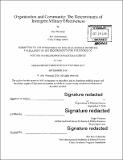Organization and community : the determinants of insurgent military effectiveness
Author(s)
Worsnop, Alec
DownloadFull printable version (41.55Mb)
Alternative title
Determinants of insurgent military effectiveness
Other Contributors
Massachusetts Institute of Technology. Department of Political Science.
Advisor
Roger Petersen.
Terms of use
Metadata
Show full item recordAbstract
The United States and other members of the international community have expended billions of dollars and thousands of lives confronting insurgent organizations across the globe. Strikingly, however, there has been little analysis of how some groups have developed the military capacity to challenge superior forces. The importance of this question has been illustrated by the recent rise of the Islamic State in Iraq and Syria. Yet, existing research provides limited insight as (1) it has not conceptualized military effectiveness in a sub-state context, and (2) it is focused on structural determinants of insurgent behavior. Thus, I construct a conception of insurgent military effectiveness capturing distinctions such as insurgents' (in)ability to keep ceasefires or to control who is targeted by violence as well as a theory arguing that it is not the resources organizations have that determine effectiveness, but how well their organizational structure allows them to leverage those resources. In particular, the theory focuses on both informal structures of social support and formal military structures such as logistics, command and control, and personnel management systems in explaining how some insurgent organizations achieve relatively high levels of military effectiveness and others do not. After using a large-N analysis to demonstrate that structural factors are poor predictors of organizational structure and conflict outcomes, I test the theory with in-depth case studies of groups from Vietnam (1940-1975) and Iraq (2003-2016) using archival documents, interviews, and secondary sources. These two countries represent promising areas to study organizations as there is a high-degree of variation in structural and organizational factors as well as in military effectiveness. The empirical chapters provide strong support for the theory, demonstrating the importance of my organizational approach. In addition, the empirical analysis untangles puzzles such as how, in Vietnam, the Viet Minh and People's Liberation Armed Front (also known as the Viet Cong) became so successful while other nationalist and religious groups did not or, in Iraq, how the Islamic State has operated with such military prowess. The findings also help to clarify existing research-such as the study of fragmentation and the role of factors such as external support and community structure while providing precise suggestions about managing sub-state violence by helping to better identify and train partners, to craft and maintain peace agreements, and to address poor governance that perpetuates conflict.
Description
Thesis: Ph. D., Massachusetts Institute of Technology, Department of Political Science, 2016. Cataloged from PDF version of thesis. Includes bibliographical references (pages 411-439).
Date issued
2016Department
Massachusetts Institute of Technology. Department of Political SciencePublisher
Massachusetts Institute of Technology
Keywords
Political Science.